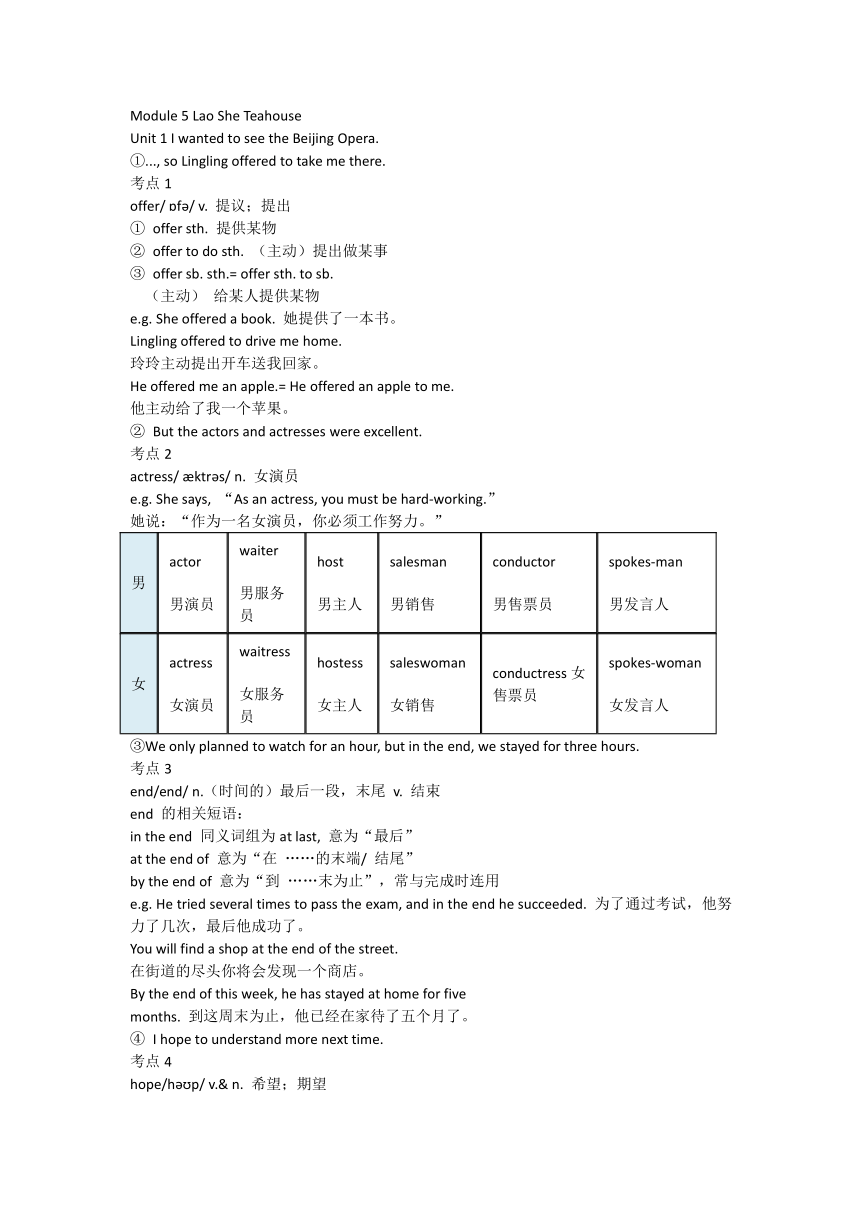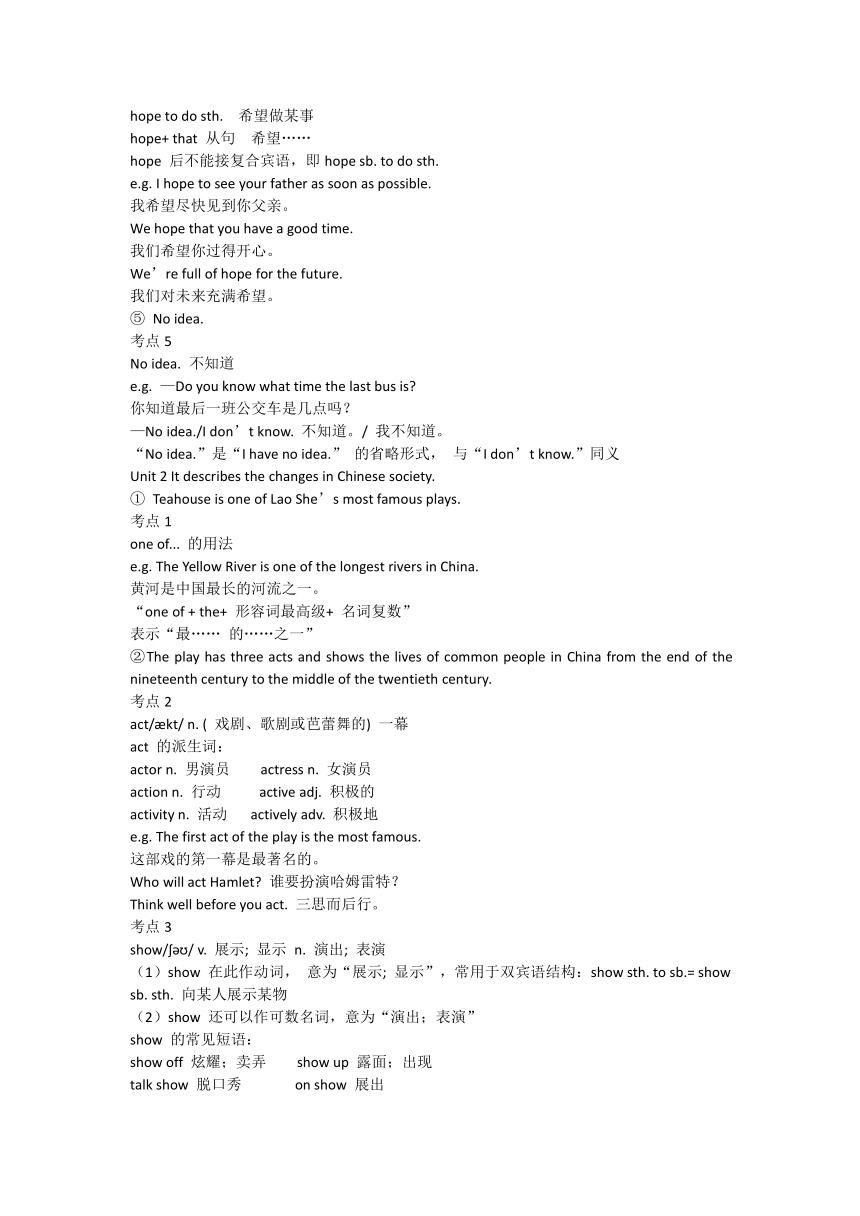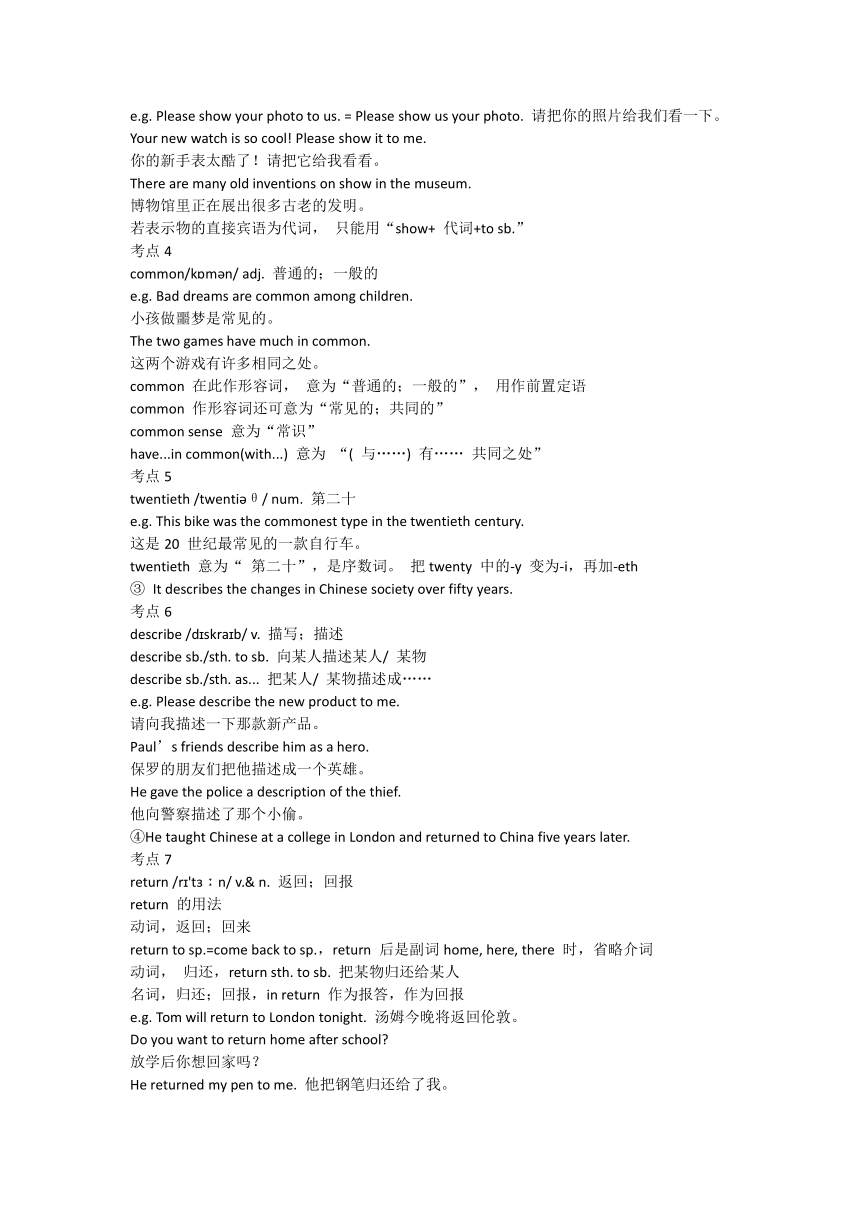Module 5 Lao She Teahouse 知识点讲义
文档属性
| 名称 | Module 5 Lao She Teahouse 知识点讲义 |  | |
| 格式 | docx | ||
| 文件大小 | 25.1KB | ||
| 资源类型 | 教案 | ||
| 版本资源 | 外研版 | ||
| 科目 | 英语 | ||
| 更新时间 | 2023-09-09 07:07:46 | ||
图片预览



文档简介
Module 5 Lao She Teahouse
Unit 1 I wanted to see the Beijing Opera.
①..., so Lingling offered to take me there.
考点1
offer/ f / v. 提议;提出
① offer sth. 提供某物
② offer to do sth. (主动)提出做某事
③ offer sb. sth.= offer sth. to sb.
(主动) 给某人提供某物
e.g. She offered a book. 她提供了一本书。
Lingling offered to drive me home.
玲玲主动提出开车送我回家。
He offered me an apple.= He offered an apple to me.
他主动给了我一个苹果。
② But the actors and actresses were excellent.
考点2
actress/ ktr s/ n. 女演员
e.g. She says, “As an actress, you must be hard-working.”
她说:“作为一名女演员,你必须工作努力。”
男 actor 男演员 waiter 男服务员 host 男主人 salesman 男销售 conductor 男售票员 spokes-man 男发言人
女 actress 女演员 waitress 女服务员 hostess 女主人 saleswoman 女销售 conductress 女售票员 spokes-woman 女发言人
③We only planned to watch for an hour, but in the end, we stayed for three hours.
考点3
end/end/ n.(时间的)最后一段,末尾 v. 结束
end 的相关短语:
in the end 同义词组为at last, 意为“最后”
at the end of 意为“在 ……的末端/ 结尾”
by the end of 意为“到 ……末为止”,常与完成时连用
e.g. He tried several times to pass the exam, and in the end he succeeded. 为了通过考试,他努力了几次,最后他成功了。
You will find a shop at the end of the street.
在街道的尽头你将会发现一个商店。
By the end of this week, he has stayed at home for five
months. 到这周末为止,他已经在家待了五个月了。
④ I hope to understand more next time.
考点4
hope/h p/ v.& n. 希望;期望
hope to do sth. 希望做某事
hope+ that 从句 希望……
hope 后不能接复合宾语,即hope sb. to do sth.
e.g. I hope to see your father as soon as possible.
我希望尽快见到你父亲。
We hope that you have a good time.
我们希望你过得开心。
We’re full of hope for the future.
我们对未来充满希望。
⑤ No idea.
考点5
No idea. 不知道
e.g. —Do you know what time the last bus is
你知道最后一班公交车是几点吗?
—No idea./I don’t know. 不知道。/ 我不知道。
“No idea.”是“I have no idea.” 的省略形式, 与“I don’t know.”同义
Unit 2 It describes the changes in Chinese society.
① Teahouse is one of Lao She’s most famous plays.
考点1
one of... 的用法
e.g. The Yellow River is one of the longest rivers in China.
黄河是中国最长的河流之一。
“one of + the+ 形容词最高级+ 名词复数”
表示“最…… 的……之一”
②The play has three acts and shows the lives of common people in China from the end of the nineteenth century to the middle of the twentieth century.
考点2
act/ kt/ n. ( 戏剧、歌剧或芭蕾舞的) 一幕
act 的派生词:
actor n. 男演员 actress n. 女演员
action n. 行动 active adj. 积极的
activity n. 活动 actively adv. 积极地
e.g. The first act of the play is the most famous.
这部戏的第一幕是最著名的。
Who will act Hamlet 谁要扮演哈姆雷特?
Think well before you act. 三思而后行。
考点3
show/ / v. 展示; 显示 n. 演出; 表演
(1)show 在此作动词, 意为“展示; 显示”,常用于双宾语结构:show sth. to sb.= show sb. sth. 向某人展示某物
(2)show 还可以作可数名词,意为“演出;表演”
show 的常见短语:
show off 炫耀;卖弄 show up 露面;出现
talk show 脱口秀 on show 展出
e.g. Please show your photo to us. = Please show us your photo. 请把你的照片给我们看一下。
Your new watch is so cool! Please show it to me.
你的新手表太酷了!请把它给我看看。
There are many old inventions on show in the museum.
博物馆里正在展出很多古老的发明。
若表示物的直接宾语为代词, 只能用“show+ 代词+to sb.”
考点4
common/k m n/ adj. 普通的;一般的
e.g. Bad dreams are common among children.
小孩做噩梦是常见的。
The two games have much in common.
这两个游戏有许多相同之处。
common 在此作形容词, 意为“普通的;一般的”, 用作前置定语
common 作形容词还可意为“常见的;共同的”
common sense 意为“常识”
have...in common(with...) 意为 “( 与……) 有…… 共同之处”
考点5
twentieth /twenti θ/ num. 第二十
e.g. This bike was the commonest type in the twentieth century.
这是20 世纪最常见的一款自行车。
twentieth 意为“ 第二十”,是序数词。 把twenty 中的-y 变为-i,再加-eth
③ It describes the changes in Chinese society over fifty years.
考点6
describe /d skra b/ v. 描写;描述
describe sb./sth. to sb. 向某人描述某人/ 某物
describe sb./sth. as... 把某人/ 某物描述成……
e.g. Please describe the new product to me.
请向我描述一下那款新产品。
Paul’s friends describe him as a hero.
保罗的朋友们把他描述成一个英雄。
He gave the police a description of the thief.
他向警察描述了那个小偷。
④He taught Chinese at a college in London and returned to China five years later.
考点7
return /r 't n/ v.& n. 返回;回报
return 的用法
动词,返回;回来
return to sp.=come back to sp.,return 后是副词home, here, there 时,省略介词
动词, 归还,return sth. to sb. 把某物归还给某人
名词,归还;回报,in return 作为报答,作为回报
e.g. Tom will return to London tonight. 汤姆今晚将返回伦敦。
Do you want to return home after school
放学后你想回家吗?
He returned my pen to me. 他把钢笔归还给了我。
I sent him a book; in return, I got a coat.
我送给了他一本书;作为回报,我得到了一件外套。
⑤He wrote many plays, novels and short stories about people’s lives, and was named “the People’s Artist”.
考点8
name /ne m/ v. 给……取名 ;给……命名
★有关name 的用法
be named=be called 被称为
name...after 以……的名字给……取名
...named... 叫……的……
e.g. He named his son John. 他给他的儿子起名叫约翰。
The building was named after a famous writer.
这座楼是以一个著名作家的名字来命名的。
⑥If you like the Beijing Opera, traditional music or magic shows, you can enjoy them at the teahouse.
考点9
if/ f/ conj. 如果;若
if 引导条件状语从句, 遵循主将从现原则 if 引导宾语从句时,常意为“是否”,此时if 引导的宾语从句时态应由 动作发生的时间决定
e.g. If it doesn’t rain tomorrow, we’ll go to visit the Great Wall.
如果明天不下雨,我们将去参观长城。
I don’t know if he will go to America next year.
我不知道他明年是否会去美国。
Unit 3Language in use
①It describes the hard life of Ah Q and makes people think about society.
考点1
make /me k/ v. 促使;使得
e.g. The boss made the workers work ten hours a day.
老板使工人们一天工作10 个小时。
I’ll let someone repair the bike for you.
我会让人为你修理自行车的。
拓展:“make + sb.+adj.”意为“使某人……”。
e.g. Listening to music makes me relaxed. 听音乐使我放松。
What you said made her sad. 你说的话使她很伤心。
★ make sb. do sth.
使某人做某事
有类似用法的使役动词还有have, let 等。
②Li Nan, the student playing Wang Lifa, the owner of the teahouse, was the best.
考点2
现在分词短语作后置定语
此处playing Wang Lifa 作后置定语,修饰the student,现在分词短语作定语,表示主动和进行意义。
e.g. Do you know the man standing over there by the door
你认识站在门那边的那个男人吗?
There were some people running in the park.
公园里有一些人在跑步。
③He brought Wang Lifa to life, from a young man to an old man.
考点3 bring...to life 使……生动 / 鲜活
e.g. His novels bring the Victorian era to life.
他的小说把维多利亚时代写活了。
bring...to life 既可意为: “使……生动 / 鲜活”, 也可意为“使苏醒”。
动词不定式(一)和双宾语
考点1
动词不定式(一)
考向1
跟不定式作宾语的动词
agree, ask, decide, choose, expect, hope, fail, happen, help, learn, mean, manage, offer, plan, promise, refuse, seem, wait, wish... 有些动词后常接动词的 -ing 形式作宾语,这类动词有enjoy, fi nish, avoid等。
e.g. I want to know the answer to your question.
我想知道你那道问题的答案。
考向2
“v. + it + adj .+to do”,当复合宾语中的宾语是不定式时,先用形式宾语it代替不定式,可以接此类复合宾语的动词有:find, think, believe, consider 等。
e.g. We think it quite important to learn a foreign language well.
我们认为学好一门外语相当重要。
考向3
既可接动词不定式又可接动词的-ing 形式作宾语,意思差别不太大的动词有:begin, start, continue 等。
e.g. Then I started watching/ to watch TV.
然后我开始看电视。
考向4 后接动词不定式或动词的-ing 形式作宾语,意思差别较大的动词有:
stop to do 停下来去做某事
doing 停止做某事
forget to do 忘记要去做某事
doing 忘记做过某事
remember to do 记得去做某事
doing 记得做过某事
try to do 努力,尽力做某事
doing 试着做某事
go on to do 做了一件事后,接着做另一件事
doing 继续或不间断地做某事
考点2
双宾语
英语中,有些及物动词后可接两个宾语,一个指物,叫直接宾语;一个指人,叫间接宾语。“及物动词+ 间接宾语+ 直接宾语”和“及物动词+直接宾语+ 介词+ 间接宾语”都是双宾语结构。
分类 例词 例句
可以接双宾语且能用to来置换宾语位置的动词 give,tell,send,write,pass,offer,show 等 The English teacher told us an interesting story.= The English teacher told an interesting story to us. 英语老师给我们讲了一个有趣的故事。
可以接双宾语且能用 for来置换宾语位置的动词 buy,get,find,make,cook,order 等 My father will buy me a new bike tomorrow.= My father will buy a new bike for me tomorrow. 我爸爸明天要给我买辆新自行车。
注意: 下列情况常用“及物动词+直接宾语 +介词+间接宾语”结构。
当直接宾语是代词时 They picked up some books and handed them to the little boy. 他们捡起一些书,并交给了那个小男孩。
当间接宾语比直接宾语长时 I’ll pass the message to the people who live around us. 我要把信息传递给住在我们周围的人们。
当需要强调间接宾语时 You should give the notebook to the headmaster himself. 你应该把笔记本交给校长本人。
考向2
双宾语易位时需借助介词 to 的常用动词有:
hand lend mail offer pass
pay post return send sell
serve show take teach tell
throw write bring
考向3
双宾语易位时需借助介词 for 的常用动词有:
book buy cook draw get make pick prepare
e.g. Her uncle bought her an English-Chinese dictionary yesterday.=Her uncle bought an English-Chinese dictionary for her yesterday.
昨天,她叔叔给她买了一本英汉字典。
Unit 1 I wanted to see the Beijing Opera.
①..., so Lingling offered to take me there.
考点1
offer/ f / v. 提议;提出
① offer sth. 提供某物
② offer to do sth. (主动)提出做某事
③ offer sb. sth.= offer sth. to sb.
(主动) 给某人提供某物
e.g. She offered a book. 她提供了一本书。
Lingling offered to drive me home.
玲玲主动提出开车送我回家。
He offered me an apple.= He offered an apple to me.
他主动给了我一个苹果。
② But the actors and actresses were excellent.
考点2
actress/ ktr s/ n. 女演员
e.g. She says, “As an actress, you must be hard-working.”
她说:“作为一名女演员,你必须工作努力。”
男 actor 男演员 waiter 男服务员 host 男主人 salesman 男销售 conductor 男售票员 spokes-man 男发言人
女 actress 女演员 waitress 女服务员 hostess 女主人 saleswoman 女销售 conductress 女售票员 spokes-woman 女发言人
③We only planned to watch for an hour, but in the end, we stayed for three hours.
考点3
end/end/ n.(时间的)最后一段,末尾 v. 结束
end 的相关短语:
in the end 同义词组为at last, 意为“最后”
at the end of 意为“在 ……的末端/ 结尾”
by the end of 意为“到 ……末为止”,常与完成时连用
e.g. He tried several times to pass the exam, and in the end he succeeded. 为了通过考试,他努力了几次,最后他成功了。
You will find a shop at the end of the street.
在街道的尽头你将会发现一个商店。
By the end of this week, he has stayed at home for five
months. 到这周末为止,他已经在家待了五个月了。
④ I hope to understand more next time.
考点4
hope/h p/ v.& n. 希望;期望
hope to do sth. 希望做某事
hope+ that 从句 希望……
hope 后不能接复合宾语,即hope sb. to do sth.
e.g. I hope to see your father as soon as possible.
我希望尽快见到你父亲。
We hope that you have a good time.
我们希望你过得开心。
We’re full of hope for the future.
我们对未来充满希望。
⑤ No idea.
考点5
No idea. 不知道
e.g. —Do you know what time the last bus is
你知道最后一班公交车是几点吗?
—No idea./I don’t know. 不知道。/ 我不知道。
“No idea.”是“I have no idea.” 的省略形式, 与“I don’t know.”同义
Unit 2 It describes the changes in Chinese society.
① Teahouse is one of Lao She’s most famous plays.
考点1
one of... 的用法
e.g. The Yellow River is one of the longest rivers in China.
黄河是中国最长的河流之一。
“one of + the+ 形容词最高级+ 名词复数”
表示“最…… 的……之一”
②The play has three acts and shows the lives of common people in China from the end of the nineteenth century to the middle of the twentieth century.
考点2
act/ kt/ n. ( 戏剧、歌剧或芭蕾舞的) 一幕
act 的派生词:
actor n. 男演员 actress n. 女演员
action n. 行动 active adj. 积极的
activity n. 活动 actively adv. 积极地
e.g. The first act of the play is the most famous.
这部戏的第一幕是最著名的。
Who will act Hamlet 谁要扮演哈姆雷特?
Think well before you act. 三思而后行。
考点3
show/ / v. 展示; 显示 n. 演出; 表演
(1)show 在此作动词, 意为“展示; 显示”,常用于双宾语结构:show sth. to sb.= show sb. sth. 向某人展示某物
(2)show 还可以作可数名词,意为“演出;表演”
show 的常见短语:
show off 炫耀;卖弄 show up 露面;出现
talk show 脱口秀 on show 展出
e.g. Please show your photo to us. = Please show us your photo. 请把你的照片给我们看一下。
Your new watch is so cool! Please show it to me.
你的新手表太酷了!请把它给我看看。
There are many old inventions on show in the museum.
博物馆里正在展出很多古老的发明。
若表示物的直接宾语为代词, 只能用“show+ 代词+to sb.”
考点4
common/k m n/ adj. 普通的;一般的
e.g. Bad dreams are common among children.
小孩做噩梦是常见的。
The two games have much in common.
这两个游戏有许多相同之处。
common 在此作形容词, 意为“普通的;一般的”, 用作前置定语
common 作形容词还可意为“常见的;共同的”
common sense 意为“常识”
have...in common(with...) 意为 “( 与……) 有…… 共同之处”
考点5
twentieth /twenti θ/ num. 第二十
e.g. This bike was the commonest type in the twentieth century.
这是20 世纪最常见的一款自行车。
twentieth 意为“ 第二十”,是序数词。 把twenty 中的-y 变为-i,再加-eth
③ It describes the changes in Chinese society over fifty years.
考点6
describe /d skra b/ v. 描写;描述
describe sb./sth. to sb. 向某人描述某人/ 某物
describe sb./sth. as... 把某人/ 某物描述成……
e.g. Please describe the new product to me.
请向我描述一下那款新产品。
Paul’s friends describe him as a hero.
保罗的朋友们把他描述成一个英雄。
He gave the police a description of the thief.
他向警察描述了那个小偷。
④He taught Chinese at a college in London and returned to China five years later.
考点7
return /r 't n/ v.& n. 返回;回报
return 的用法
动词,返回;回来
return to sp.=come back to sp.,return 后是副词home, here, there 时,省略介词
动词, 归还,return sth. to sb. 把某物归还给某人
名词,归还;回报,in return 作为报答,作为回报
e.g. Tom will return to London tonight. 汤姆今晚将返回伦敦。
Do you want to return home after school
放学后你想回家吗?
He returned my pen to me. 他把钢笔归还给了我。
I sent him a book; in return, I got a coat.
我送给了他一本书;作为回报,我得到了一件外套。
⑤He wrote many plays, novels and short stories about people’s lives, and was named “the People’s Artist”.
考点8
name /ne m/ v. 给……取名 ;给……命名
★有关name 的用法
be named=be called 被称为
name...after 以……的名字给……取名
...named... 叫……的……
e.g. He named his son John. 他给他的儿子起名叫约翰。
The building was named after a famous writer.
这座楼是以一个著名作家的名字来命名的。
⑥If you like the Beijing Opera, traditional music or magic shows, you can enjoy them at the teahouse.
考点9
if/ f/ conj. 如果;若
if 引导条件状语从句, 遵循主将从现原则 if 引导宾语从句时,常意为“是否”,此时if 引导的宾语从句时态应由 动作发生的时间决定
e.g. If it doesn’t rain tomorrow, we’ll go to visit the Great Wall.
如果明天不下雨,我们将去参观长城。
I don’t know if he will go to America next year.
我不知道他明年是否会去美国。
Unit 3Language in use
①It describes the hard life of Ah Q and makes people think about society.
考点1
make /me k/ v. 促使;使得
e.g. The boss made the workers work ten hours a day.
老板使工人们一天工作10 个小时。
I’ll let someone repair the bike for you.
我会让人为你修理自行车的。
拓展:“make + sb.+adj.”意为“使某人……”。
e.g. Listening to music makes me relaxed. 听音乐使我放松。
What you said made her sad. 你说的话使她很伤心。
★ make sb. do sth.
使某人做某事
有类似用法的使役动词还有have, let 等。
②Li Nan, the student playing Wang Lifa, the owner of the teahouse, was the best.
考点2
现在分词短语作后置定语
此处playing Wang Lifa 作后置定语,修饰the student,现在分词短语作定语,表示主动和进行意义。
e.g. Do you know the man standing over there by the door
你认识站在门那边的那个男人吗?
There were some people running in the park.
公园里有一些人在跑步。
③He brought Wang Lifa to life, from a young man to an old man.
考点3 bring...to life 使……生动 / 鲜活
e.g. His novels bring the Victorian era to life.
他的小说把维多利亚时代写活了。
bring...to life 既可意为: “使……生动 / 鲜活”, 也可意为“使苏醒”。
动词不定式(一)和双宾语
考点1
动词不定式(一)
考向1
跟不定式作宾语的动词
agree, ask, decide, choose, expect, hope, fail, happen, help, learn, mean, manage, offer, plan, promise, refuse, seem, wait, wish... 有些动词后常接动词的 -ing 形式作宾语,这类动词有enjoy, fi nish, avoid等。
e.g. I want to know the answer to your question.
我想知道你那道问题的答案。
考向2
“v. + it + adj .+to do”,当复合宾语中的宾语是不定式时,先用形式宾语it代替不定式,可以接此类复合宾语的动词有:find, think, believe, consider 等。
e.g. We think it quite important to learn a foreign language well.
我们认为学好一门外语相当重要。
考向3
既可接动词不定式又可接动词的-ing 形式作宾语,意思差别不太大的动词有:begin, start, continue 等。
e.g. Then I started watching/ to watch TV.
然后我开始看电视。
考向4 后接动词不定式或动词的-ing 形式作宾语,意思差别较大的动词有:
stop to do 停下来去做某事
doing 停止做某事
forget to do 忘记要去做某事
doing 忘记做过某事
remember to do 记得去做某事
doing 记得做过某事
try to do 努力,尽力做某事
doing 试着做某事
go on to do 做了一件事后,接着做另一件事
doing 继续或不间断地做某事
考点2
双宾语
英语中,有些及物动词后可接两个宾语,一个指物,叫直接宾语;一个指人,叫间接宾语。“及物动词+ 间接宾语+ 直接宾语”和“及物动词+直接宾语+ 介词+ 间接宾语”都是双宾语结构。
分类 例词 例句
可以接双宾语且能用to来置换宾语位置的动词 give,tell,send,write,pass,offer,show 等 The English teacher told us an interesting story.= The English teacher told an interesting story to us. 英语老师给我们讲了一个有趣的故事。
可以接双宾语且能用 for来置换宾语位置的动词 buy,get,find,make,cook,order 等 My father will buy me a new bike tomorrow.= My father will buy a new bike for me tomorrow. 我爸爸明天要给我买辆新自行车。
注意: 下列情况常用“及物动词+直接宾语 +介词+间接宾语”结构。
当直接宾语是代词时 They picked up some books and handed them to the little boy. 他们捡起一些书,并交给了那个小男孩。
当间接宾语比直接宾语长时 I’ll pass the message to the people who live around us. 我要把信息传递给住在我们周围的人们。
当需要强调间接宾语时 You should give the notebook to the headmaster himself. 你应该把笔记本交给校长本人。
考向2
双宾语易位时需借助介词 to 的常用动词有:
hand lend mail offer pass
pay post return send sell
serve show take teach tell
throw write bring
考向3
双宾语易位时需借助介词 for 的常用动词有:
book buy cook draw get make pick prepare
e.g. Her uncle bought her an English-Chinese dictionary yesterday.=Her uncle bought an English-Chinese dictionary for her yesterday.
昨天,她叔叔给她买了一本英汉字典。
同课章节目录
- Module 1 How to learn English
- Unit 1 Let's try to speak English as much as possi
- Unit 2 You should smile at her.
- Unit 3 Language in use .
- Module 2 My home town and my country
- Unit 1 It's taller than many other buildings.
- Unit 2 Cambridge is a beautiful city in the east o
- Unit 3 Language in use .
- Module 3 Sports.
- Unit 1 Nothing is more exciting than playing tenni
- Unit 2 This year we training more carefully.
- Unit 3 Language in use .
- Module 4 Planes, ships and trains .
- Unit 1 He lives the farthest from school.
- Unit 2 What is the best way to travel.
- Unit 3 Language in use .
- Module 5 Lao She Teahouse.
- Unit 1 I wanted to see the Beijing Opera.
- Unit 2 It descibes the changes in Chinese society.
- Unit 3 Language in use .
- Module 6 Animals in danger.
- Unit 1 It allows people to get closer to them .
- Unit 2 The WWF is working hard to save them all.
- Unit 3 Language in use .
- Revision module A
- Module 7 A famous story
- Unit 1 Alice was sitting with her sister by the ri
- Unit 2 She was thinking about her cat.
- Unit 3 Language in use .
- Module 8 Accidents
- Unit 1 While the car were changing to red, a car s
- Unit 2 I was trying to pick it up when it bite me
- Unit 3 Language in use .
- Module 9 Population
- Unit 1 The population of China is about 1.37 billi
- Unit 2 Arnwick was a city with 200,000 people.
- Unit 3 Language in use .
- Module 10 The weathe
- Unit 1 It might snow.
- Unit 2 The weather is fine all year round.
- Unit 3 Language in use .
- Module 11 Way of life
- Unit 1 In China ,we open a gift later.
- Unit 2 In England, you usually drink tea with milk
- Unit 3 Language in use .
- Module 12 Help
- Unit 1 What should we do before help arrives?
- Unit 2 Stay away from windows and heavy furniture.
- Unit 3 Language in use .
- Revision module B
